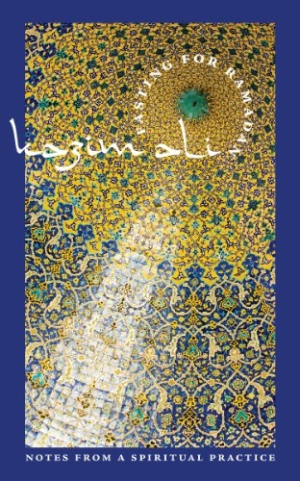Fasting for Ramadan
Ramadan, the annual month-long fast, is one of the five pillars of the Islamic faith. Along with believing in the Oneness of God, praying five times daily, tithing a percent of one’s income to the needy, and making the “haj,” or pilgrimage to Mecca, it’s part of the creed that devout Muslims live by.
In his beautiful book of essays, Kazim Ali describes a poetic, ritualistic practice that’s about far more than duty; for him, Ramadan represents the opportunity to elevate one’s consciousness through acute bodily awareness. “So I empty myself not to be filled but to experience the emptiness,” explains Ali. “I leave the world to observe my appetite for it.”
Throughout the two-part meditation, which contains observations on as many Ramadan fasts, Ali struggles with how to apply the wisdom and reflection he earns from this abstinence to the bulk of his life. He’s a writer and a professor and he can’t concentrate as well when he’s hungry; his daily routine of running falls away when he can no longer summon the energy. Accepting weakness is difficult for Ali, as it is for most of us, and it also becomes an important achievement.
People observing Ramadan, he points out, are alone together, which is a meaningful relationship. He feels a special closeness to his mother for having shared the experience when he was a teenager, and those memories help him through the long hours of the fasts described in this book.
In the process of coming to know Ali, the reader also learns about Islam: Ramadan does not happen at the same time each year; its beginning and end are determined by the size of the moon as observed by an appointed sheik. Traditionally, if an able-bodied person—menstruating and nursing women are exempt from the practice—breaks their Ramadan fast, he is supposed to pay for the release of captives or enslaved people. The fast, which denies its adherents food and water during daylight hours, is ideally broken in company each evening with dates and water.
The author talks around his status as a gay man who feels sidelined from his religion. Perhaps in response to that feeling of being exiled, he doesn’t embrace all of the pillars of his childhood religion: he doesn’t pray five times daily, and almost never in company or on Friday afternoon, the most important prayer of the week. Ali is rewriting some of Islam’s tenets and thereby coming to faith, belief, and worship on his own terms. As readers, we’re fortunate to be sharing in his process of growth.
The practice of fasting can transport you. This reviewer experienced its allure after returning from living in Cairo, as a way of returning to the less frenetic and more focused mindset of that distant culture. Fasting For Ramadan is recommended for those seeking an inroad to Islam and for all who relish a lyrical perspective on life beyond their own everyday routine.
Reviewed by
Julie Eakin
Disclosure: This article is not an endorsement, but a review. The publisher of this book provided free copies of the book to have their book reviewed by a professional reviewer. No fee was paid by the publisher for this review. Foreword Reviews only recommends books that we love. Foreword Magazine, Inc. is disclosing this in accordance with the Federal Trade Commission’s 16 CFR, Part 255.

